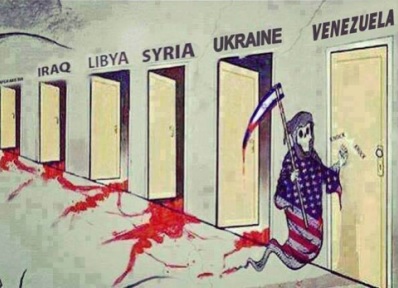
Image above from TheTechnocraticTyranny.com, published 2/27/2016, “State Department’s Mission: Coup d’etat"
2/21/19, “When Humanitarian Aid Is Used as a Weapon to Bring Down Regimes,“ The Atlantic, Dylan Baddour, Cucuta, Colombia
“As the United States offers crucial humanitarian aid to Venezuelan migrants, it is doubling down on its opposition to Venezuela’s president.”
“Here at the Venezuelan border, American officials have addressed the press several times in recent days, touting a project meant to challenge the rule of Venezuela’s leadership.
But it is one that has aid workers and international organizations worried.
First there was the United States’ ambassador to Colombia, Kevin Whitaker [an Obama holdover [screw MAGA] and among key participants in Obama’s 2015 failed attempt to violently remove Maduro], who spoke near a barricaded border bridge close to where the first shipments of American aid to Venezuela had arrived. Days later, Mark Green, the director of USAID, addressed journalists from a podium on the tarmac at the airport here as forklifts behind him unloaded pallets of [US taxpayer supplied] humanitarian supplies from military cargo planes. Then Senator Marco Rubio [another repeat performer from Obama’s Feb. 2015 failed attempt to murder Maduro], a leading critic of the government in Caracas, came to meet the Venezuelan managers of the plan to carry these 200 tons of aid into their country on Saturday morning.
These supplies of groceries, nutrition biscuits, vitamin supplements, hygiene products, and medical aid are what the United States hopes will help force Venezuelan President Nicolás Maduro from power.
“Freedom and democracy deserve sacrifice,” Rubio said in Spanish to a crowd of hundreds of journalists and spectators gathered Sunday under the sweltering sun, a few hundred feet from the Venezuelan border. “Tyrants don’t go easily.”
[Ed. note: Rubio is confused. “Tyrants” invade a sovereign nation and attempt to remove an elected president.]
(continuing): “Ostensibly aimed at alleviating Venezuela’s spiraling crises of hunger, health, and security, the humanitarian aid put forward by the United States also serves another purpose. Venezuelan opposition leaders here and the U.S. officials offering up much-needed aid posit that the mission could induce military officers to turn away from their government. Aid groups on the ground worry, however, that a political operation thinly padded with humanitarian objectives could send a precarious situation down an even worse path—disastrous American efforts to intervene in Latin America from decades past serve as a reminder of how badly things can go.
After years of decline, living conditions for most Venezuelans worsened substantially in the past year. Thousands of people who flee the country each day, many on foot, testify to miserable hunger and sickness at home, where food continues to grow scarcer. Then last month [Jan. 2019], Maduro officially began a new term in office after winning what [so-called] international observers said was a sham election, and tensions ratcheted up markedly. Venezuelan legislators hailed their own leader, Juan Guaidó, as the interim president, and huge protests erupted across the country. In the weeks since, though, Guaidó’s efforts to win over Venezuela’s powerful military leaders have made little headway, and the two sides are now deadlocked.
Throughout, international aid organizations including the United Nations have quietly been delivering assistance throughout Venezuela, with the tacit approval of Maduro’s regime [elected government], which has long restricted humanitarian aid and has falsely denied that any Venezuelans are going hungry. A huge concert in Cúcuta on Friday aims to raise additional funds for food and medicine. More U.S. government funds could simply be moved to those programs, were the objective solely to address the humanitarian crisis.
Instead, Venezuelan opposition leaders here say they plan to use U.S. assistance to turn this page in Venezuelan history. Guaidó has said that he asked Washington to bring the aid, and that his representatives will take it across the border on Saturday. Maduro has ordered the army not to allow in the supplies from the United States—the archenemy of the socialist revolution he inherited from Hugo Chávez—but [depraved] American officials have called upon Venezuelan forces to forsake their orders.
Those who support the mission say that soldiers will be motivated by the impact Venezuela’s crisis is having on their families to switch sides and effect a peaceful transfer of power. In an emailed statement, USAID said that Maduro’s management has damaged Venezuela, and that the agency would “continue to take concrete action against those who oppose the peaceful restoration of [so-called] democracy in Venezuela.”
“These planes don’t just bring food and medicine,” Lester Toledo, Guaidó’s top representative in Cúcuta, said during a widely televised press conference with American and Colombian officials. “They bring hope.” [“Hope?” The IMF is something to “hope” for?]
Virtually all other major humanitarian organizations, however, have kept their distance. Many aid workers were wary of talking on the record, fearing repercussions for themselves and their organization. One director of a humanitarian-assistance team told me that using what was apparently an aid mission to challenge a president stood against the principles of humanitarianism, while another said the effort was little more than an attempted overthrow of the government. Christian Visnes, the director of the Norwegian Refugee Council in Colombia, didn’t want to address the specific situation, but told me that there were “dangers of associating political objectives with humanitarian aid,” and warned that sometimes “crises evolve into bigger crises.”
Many in Latin America are also suspicious about the eventual course of any U.S. intervention in regional affairs—Washington has a long and troubled history of stepping in, with deadly and disastrous results.
The examples are numerous. The United States sought to overthrow Chile’s socialist president Salvador Allende in the 1970s, a move that eventually led to the brutal 27-year rule of Augusto Pinochet. It used a humanitarian-aid program in Nicaragua in the 1980s to hide $27 million in weapons for right-wing groups fighting a leftist government, fueling a civil war (a scandal that involved Elliott Abrams, who is now Donald Trump’s special envoy for Venezuela). And in 1989, the U.S. left hundreds of civilians dead in Panama when American forces invaded to overthrow the country’s de facto leader, Manuel Noriega….
For Ana Teresa Castillo, who runs an organization called Asociación Deredez that has for years helped hungry people at the Venezuela-Colombia border, the latest U.S. effort seems like a dangerous stunt. She told me that she was saddened to see so much food locked away in a warehouse, and worried that little would make it to the needy. Having lived a life plagued by violence—a Colombian guerilla group took over her home and killed her husband 20 years ago, so she fled to Venezuela, where soldiers violently evicted her and thousands of other Colombians from the border area in 2015—she worries that Washington’s moves are a prelude to more conflict.
“What we hope is that this doesn’t become a second Syria, especially with that crazy guy in charge in Venezuela,” she told me over lunch in her home. “Who is going to suffer? The civilians. The poor. Us here.”
..........
..........
Added: US has wanted to overthrow Venezuela for awhile. In Dec. 2014 Obama enacted draconian sanctions against Venezuela, and in Feb. 2015 actually ordered US personnel to murder Maduro and replace him with Corina Machado. From Atlantic article below we learn that among those on the scene in Colombia at the Venezuela-Colombia border is the deeply corrupt IRC, International Rescue Committee. In 2016 IRC was under investigation by the United States over allegations of corruption and bid rigging in projects intended to help Syrian civilians and refugees. (5/11/2016, “David Miliband’s refugee aid group in corruption probe,” UK Telegraph, Louisa Loveluck, Istanbul). IRC has also sexually abused West African refugee children, is one of 15 international aid groups that “exploited refugee children and women in West Africa by trading food for sex” which the United Nations knew but kept quiet about for 16 years. Depraved “aid” groups include: “UNHCR, the World Food Programme, Save the Children, Merlin, Medecins Sans Frontieres, Care International, the International Rescue Committee, the International Federation of Red Cross Societies and the Norwegian Refugee Council.”…5/29/18, “UN knew years ago about refugee sex-for-food scandal, leaked report reveals,” NY Post, Lia Eustachewich. Millions of US tax dollars are funneled to IRC since it’s among the top contractors in the lucrative US refugee resettlement racket.
Venezuela’s problem is that it was spectacularly successful as recently as 2009. Soros doesn’t allow ordinary people to be happy and prosperous and the US political class is completely on board with that view.
IRC award winner George Soros has long controlled Venezuela neighbor Colombia via his US State Dept. influence. It’s no surprise that Colombia became a NATO partner in 2018–-despite being nowhere near the North Atlantic. Convicted felon Soros is a business partner of Jared Kusher and a big benefactor of Pres. Trump.

........
Above image, IRC pres. David Miliband with George Soros, 2013 IRC Freedom Award winner via Refugee Resettlement Watch.
……………..
1/30/19, “Colombia’s Radical Plan to Welcome Millions of Venezuelan Migrants,” The Atlantic, Dylan Baddour
““I’ve never seen a government [Colombia] trying this hard to register people and leave the borders open,” Trisha Bury, a deputy director for the International Rescue Committee, a [so-called] migration nonprofit, told me near the Venezuelan border. “Unfortunately, the scale of this crisis, and the speed at which it changes, is more than Colombia can handle.”
Just 10 years ago, Colombians looked up to their neighbors to the east. Not only were Venezuelans the wealthiest people on the continent, but the country had the most equal income distribution, as well as a fiercely patriotic and charismatic leader and ample energy reserves. Colombians listened with bewilderment and awe as Hugo Chávez, the self-proclaimed revolutionary president of Venezuela, moved the masses and called for a proud pan-Latino identity. Millions even fled Colombia for Venezuela, mostly rural poor displaced by their country’s [Colombia] decades-long civil war. No one imagined then that the two countries’ relationship would change so dramatically.
When Chávez died, in 2013, his successor, Nicolás Maduro, inherited a country in decline. The economy was cratering, and inflation was accelerating. Maduro, blaming a Colombian conspiracy for the economic problems, expelled thousands of Colombians living in a frontier area and shut the border.
When it finally reopened, the flow of people began going in the opposite direction. Tens of thousands of Venezuelans poured into Colombia on the first Sunday the border was open, in July 2016. [In Dec. 2014 the Obama admin. began draconian sanctions against Venezuela and in Feb. 2015 actually ordered US personnel to murder Maduro and replace him with Machado]. Initially, many simply bought medicine and food and returned home to Venezuela, though some stayed. As the situation worsened in Venezuela, that shift became more permanent: At least 65,000 Venezuelans moved into Colombia in the first 90 days after the reopening; a year later, that figure had risen to 470,000; and in November 2018, it surpassed 1 million. An estimated 150,000 people have migrated to or through Colombia from Venezuela each month for the past year. That’s about as much as one of the infamous “migrant caravans” that capture attention in the United States per day, every day.
The UN [meaning US/Soros] has said it expects the numbers of migrants to become comparable with those crossing the Mediterranean in 2015. By 2021, the Colombian foreign minister has said, his country may be playing host to 4 million Venezuelans. The figures are shocking in any circumstance, let alone for a country [Colombia] that [unlike the US] has experienced little incoming migration in recent memory.
Those crossing the border include people such as Gustavo Colón. “I’m going to walk until I find work,” Colón, who used to work at a chicken-processing plant in Maracay, Venezuela, told me….
The 23-year-old was resting by the roadside after a day’s walk into Colombia, eating a tamale that a local had given him. The Venezuelan’s goal was to make some money to send home to his wife and newborn so that they could eventually take the bus to join him on this side of the border. The tamale, rice and chicken stuffed in a banana leaf, was the heartiest meal he could remember eating, he said….
From the very start, the national migration authority here worked to document the new arrivals, but struggled to keep up. It issued hundreds of thousands of identity cards to Venezuelans, allowing them to come and go freely within a specially designated border zone, though not further inland, and created a new immigration status applicable to Venezuelans already in the country. More than half a million Venezuelans were given the right to work. Though officials extended the registration period three weeks past its scheduled conclusion, the program expired in late December 2018.
Officials say they are adapting the program; analysts say this is likely because they expected the influx would have slowed by now….
“There is vast literature in economics showing how migrants are entrepreneurs at a much higher rate than locals,” said Dany Bahar, a Venezuelan-born economist who studies migration at the Brookings Institution in Washington, D.C. “The act of migrating itself is an act of risk taking, [is that you, Jeb Bush?] and that’s the kind of profile of an entrepreneur.”…
But here, the pressures are beginning to show. Many schools in the border zone have taken in up to 300 students without adding new teachers. As migrants typically settle in the poorest areas of cities, schools with the fewest resources are bearing the heaviest load. And because Venezuelans have access to only limited emergency care at Colombian hospitals, waiting rooms and wards at clinics across the country have become overcrowded. With local housing stock unable to cope with the numbers of newcomers, many migrants can be found sleeping in town plazas….
Managing these huge numbers remains a challenge, raising worries that Venezuelan doctors or engineers unable to find work will end up picking coffee on Colombian farms, depressing wages for everyone; that children will be diverted into drug gangs; and that untreated health problems could spread
“It’s impressive that the Colombian government has opened its arms,” Provash Budden, the Americas regional director for the aid organization Mercy Corps, told me. “But there has to be a longer-term plan.””
Added: US failed 2015 coup in Venezuela:
2/24/2015, “Obama failed his coup in Venezuela,“ Voltaire Network, Thierry Meyssan
“Once again, the Obama administration has tried to force the change of a political regime that resists it. On February 12, [2015] an Academi (formerly Blackwater) plane
disguised as an aircraft of the Venezuelan army was supposed to bomb
the presidential palace and kill President Nicolas Maduro. The plotters had planned to place former MP María Corina Machado in power and have her immediately acclaimed by former Latin American presidents.”
“Operation Jericho” was supervised by the National Security Council (NSC), under the authority of Ricardo Zuñiga. This “diplomat” is the grandson of the homonymous president of the Honduran National Party who organized the coups of 1963 and 1972 in favor of General López Arellano. He directed the CIA station in Havana (2009-11), where he recruited and financed agents to form the opposition to Fidel Castro while negotiating the resumption of diplomatic relations with Cuba (finally concluded in 2014).
As always in this type of operation, Washington is careful to not appear involved in the events it leads. The CIA works through supposedly non-governmental organizations to organize coup leaders: the National Endowment for Democracy [NED] and its two pseudopods of the right (the International Republican Institute) and left (the National Democratic Institute) Freedom House and the International Center for Non-Profit Law. In addition, the United States always seeks allies to outsource parts of the coup, in this case at least Germany (responsible for the protection of NATO nationals during the coup), Canada (responsible for controlling the civilian international airport in Caracas), Israel (responsible for the assassination of Chavez personalities) and the UK (in charge of the propaganda coup).
Finally, they mobilize their political networks that are ready to recognize the coup: Washington Senator Marco Rubio, former Chile president, Sebastián Piñera, in Colombia former Presidents Alvaro Uribe and Andres Pastrana, in Mexico the former presidents Felipe Calderón and Vicente Fox, in Spain the former President of the Government José María Aznar.
To justify the coup, the White House had encouraged large Venezuelan companies to warehouse rather than distribute essential commodities. The idea was to cause queues at the shops, and to infiltrate agents into the crowd to cause riots. In reality, though there had been supply problems in January-February and queues in front of stores, never did Venezuelans attack shops.
To strengthen its economic action, on December 18, 2014, President Obama signed a law imposing new sanctions against Venezuela and several of its leaders. Officially, this was to punish individuals who had suppressed student protests. In fact, since the beginning of the year, Washington [Obama] was paying four times the medium salary income – to gangs so that they would attack the police. The pseudo-students had thus killed 43 people in a few months and spread terror in the streets of the capital.
To facilitate the coordination of the coup, María Corina Machado organized a symposium in Caracas on January 26, “Citizen Power and Democracy today”, which was attended by most of the Venezuelan and foreign personalities involved.
By tracking these conspirators, Military Intelligence discovered “Operation Jericho”. On the night of February 11, the main leaders of the plot and a Mossad agent were arrested and aviation security was enhanced. Others were rounded up on the 12th. On the 20th, confessions obtained permitted the arrest of an accomplice, the mayor of Caracas, Antonio Ledezma.
For Venezuelans the failed coup poses a serious question: how do we keep democracy alive, if the main opposition leaders are in jail for the crimes they were about to commit against democracy?
For those who think, wrongly, that the United States has changed, that it is no longer an imperialist power and that now it defends democracy in the world, “Operation Jericho” provides endless food for thought.
[1] « Opération manquée au Venezuela », par Thierry Meyssan, Réseau Voltaire, 18 mai 2002.
[2] « Notre ami Danilo Anderson assassiné à Caracas », Réseau Voltaire, 19 novembre 2004. “The CIA behind Danilo Anderson’s Murder?”, by Marcelo Larrea. “FBI and CIA identified as helping Plan Venezuelan Prosecutor’s Murder”, by Alessandro Parma, Voltaire Network, 1 December 2004 and 11 November 2005.
[3] « Venezuela : conclusion d’une année déterminante », par Romain Migus, Réseau Voltaire, 10 octobre 2008. “The Albert Einstein Institution: non-violence according to the CIA”, by Thierry Meyssan, and Gene Sharp’s answer, Voltaire Network, 4 January 2005.
[4] “US against Venezuela: Cold War Goes Hot”, by Nil Nikandrov, Strategic Culture Foundation (Russia), Voltaire Network, 8 March 2014. «Las “guarimbas” de Venezuela: derecha embozada», por Martín Esparza Flores, Contralínea (México), Red Voltaire , 28 de abril de 2014.”
Thierry Meyssan
Added: US has wanted to overthrow Venezuela for awhile. In Dec. 2014 Obama enacted draconian sanctions against Venezuela, and in Feb. 2015 actually ordered US personnel to murder Maduro and replace him with Corina Machado. From Atlantic article below we learn that among those on the scene in Colombia at the Venezuela-Colombia border is the deeply corrupt IRC, International Rescue Committee. In 2016 IRC was under investigation by the United States over allegations of corruption and bid rigging in projects intended to help Syrian civilians and refugees. (5/11/2016, “David Miliband’s refugee aid group in corruption probe,” UK Telegraph, Louisa Loveluck, Istanbul). IRC has also sexually abused West African refugee children, is one of 15 international aid groups that “exploited refugee children and women in West Africa by trading food for sex” which the United Nations knew but kept quiet about for 16 years. Depraved “aid” groups include: “UNHCR, the World Food Programme, Save the Children, Merlin, Medecins Sans Frontieres, Care International, the International Rescue Committee, the International Federation of Red Cross Societies and the Norwegian Refugee Council.”…5/29/18, “UN knew years ago about refugee sex-for-food scandal, leaked report reveals,” NY Post, Lia Eustachewich. Millions of US tax dollars are funneled to IRC since it’s among the top contractors in the lucrative US refugee resettlement racket.
Venezuela’s problem is that it was spectacularly successful as recently as 2009. Soros doesn’t allow ordinary people to be happy and prosperous and the US political class is completely on board with that view.
IRC award winner George Soros has long controlled Venezuela neighbor Colombia via his US State Dept. influence. It’s no surprise that Colombia became a NATO partner in 2018–-despite being nowhere near the North Atlantic. Convicted felon Soros is a business partner of Jared Kusher and a big benefactor of Pres. Trump.

........
Above image, IRC pres. David Miliband with George Soros, 2013 IRC Freedom Award winner via Refugee Resettlement Watch.
……………..
1/30/19, “Colombia’s Radical Plan to Welcome Millions of Venezuelan Migrants,” The Atlantic, Dylan Baddour
““I’ve never seen a government [Colombia] trying this hard to register people and leave the borders open,” Trisha Bury, a deputy director for the International Rescue Committee, a [so-called] migration nonprofit, told me near the Venezuelan border. “Unfortunately, the scale of this crisis, and the speed at which it changes, is more than Colombia can handle.”
Just 10 years ago, Colombians looked up to their neighbors to the east. Not only were Venezuelans the wealthiest people on the continent, but the country had the most equal income distribution, as well as a fiercely patriotic and charismatic leader and ample energy reserves. Colombians listened with bewilderment and awe as Hugo Chávez, the self-proclaimed revolutionary president of Venezuela, moved the masses and called for a proud pan-Latino identity. Millions even fled Colombia for Venezuela, mostly rural poor displaced by their country’s [Colombia] decades-long civil war. No one imagined then that the two countries’ relationship would change so dramatically.
When Chávez died, in 2013, his successor, Nicolás Maduro, inherited a country in decline. The economy was cratering, and inflation was accelerating. Maduro, blaming a Colombian conspiracy for the economic problems, expelled thousands of Colombians living in a frontier area and shut the border.
When it finally reopened, the flow of people began going in the opposite direction. Tens of thousands of Venezuelans poured into Colombia on the first Sunday the border was open, in July 2016. [In Dec. 2014 the Obama admin. began draconian sanctions against Venezuela and in Feb. 2015 actually ordered US personnel to murder Maduro and replace him with Machado]. Initially, many simply bought medicine and food and returned home to Venezuela, though some stayed. As the situation worsened in Venezuela, that shift became more permanent: At least 65,000 Venezuelans moved into Colombia in the first 90 days after the reopening; a year later, that figure had risen to 470,000; and in November 2018, it surpassed 1 million. An estimated 150,000 people have migrated to or through Colombia from Venezuela each month for the past year. That’s about as much as one of the infamous “migrant caravans” that capture attention in the United States per day, every day.
The UN [meaning US/Soros] has said it expects the numbers of migrants to become comparable with those crossing the Mediterranean in 2015. By 2021, the Colombian foreign minister has said, his country may be playing host to 4 million Venezuelans. The figures are shocking in any circumstance, let alone for a country [Colombia] that [unlike the US] has experienced little incoming migration in recent memory.
Those crossing the border include people such as Gustavo Colón. “I’m going to walk until I find work,” Colón, who used to work at a chicken-processing plant in Maracay, Venezuela, told me….
The 23-year-old was resting by the roadside after a day’s walk into Colombia, eating a tamale that a local had given him. The Venezuelan’s goal was to make some money to send home to his wife and newborn so that they could eventually take the bus to join him on this side of the border. The tamale, rice and chicken stuffed in a banana leaf, was the heartiest meal he could remember eating, he said….
From the very start, the national migration authority here worked to document the new arrivals, but struggled to keep up. It issued hundreds of thousands of identity cards to Venezuelans, allowing them to come and go freely within a specially designated border zone, though not further inland, and created a new immigration status applicable to Venezuelans already in the country. More than half a million Venezuelans were given the right to work. Though officials extended the registration period three weeks past its scheduled conclusion, the program expired in late December 2018.
Officials say they are adapting the program; analysts say this is likely because they expected the influx would have slowed by now….
“There is vast literature in economics showing how migrants are entrepreneurs at a much higher rate than locals,” said Dany Bahar, a Venezuelan-born economist who studies migration at the Brookings Institution in Washington, D.C. “The act of migrating itself is an act of risk taking, [is that you, Jeb Bush?] and that’s the kind of profile of an entrepreneur.”…
But here, the pressures are beginning to show. Many schools in the border zone have taken in up to 300 students without adding new teachers. As migrants typically settle in the poorest areas of cities, schools with the fewest resources are bearing the heaviest load. And because Venezuelans have access to only limited emergency care at Colombian hospitals, waiting rooms and wards at clinics across the country have become overcrowded. With local housing stock unable to cope with the numbers of newcomers, many migrants can be found sleeping in town plazas….
Managing these huge numbers remains a challenge, raising worries that Venezuelan doctors or engineers unable to find work will end up picking coffee on Colombian farms, depressing wages for everyone; that children will be diverted into drug gangs; and that untreated health problems could spread
“It’s impressive that the Colombian government has opened its arms,” Provash Budden, the Americas regional director for the aid organization Mercy Corps, told me. “But there has to be a longer-term plan.””
……………………….
Added: US failed 2015 coup in Venezuela:
“President Obama had given a warning. In his new doctrine of Defence (National Security Strategy), he wrote: “We stand with citizens whose full exercise of democracy is in danger, as the Venezuelans.” Yet, Venezuela is, since the adoption of the 1999 constitution, one of the most democratic countries in the world. This sentence presaged the worst to prevent it from continuing its path to independence and wealth redistribution.
It was on February 6, 2015. Washington was finishing developing the plan for the overthrow of the democratic institutions of Venezuela. The coup was planned for February 12.
It was on February 6, 2015. Washington was finishing developing the plan for the overthrow of the democratic institutions of Venezuela. The coup was planned for February 12.
“Operation Jericho” was supervised by the National Security Council (NSC), under the authority of Ricardo Zuñiga. This “diplomat” is the grandson of the homonymous president of the Honduran National Party who organized the coups of 1963 and 1972 in favor of General López Arellano. He directed the CIA station in Havana (2009-11), where he recruited and financed agents to form the opposition to Fidel Castro while negotiating the resumption of diplomatic relations with Cuba (finally concluded in 2014).
As always in this type of operation, Washington is careful to not appear involved in the events it leads. The CIA works through supposedly non-governmental organizations to organize coup leaders: the National Endowment for Democracy [NED] and its two pseudopods of the right (the International Republican Institute) and left (the National Democratic Institute) Freedom House and the International Center for Non-Profit Law. In addition, the United States always seeks allies to outsource parts of the coup, in this case at least Germany (responsible for the protection of NATO nationals during the coup), Canada (responsible for controlling the civilian international airport in Caracas), Israel (responsible for the assassination of Chavez personalities) and the UK (in charge of the propaganda coup).
Finally, they mobilize their political networks that are ready to recognize the coup: Washington Senator Marco Rubio, former Chile president, Sebastián Piñera, in Colombia former Presidents Alvaro Uribe and Andres Pastrana, in Mexico the former presidents Felipe Calderón and Vicente Fox, in Spain the former President of the Government José María Aznar.
To justify the coup, the White House had encouraged large Venezuelan companies to warehouse rather than distribute essential commodities. The idea was to cause queues at the shops, and to infiltrate agents into the crowd to cause riots. In reality, though there had been supply problems in January-February and queues in front of stores, never did Venezuelans attack shops.
To strengthen its economic action, on December 18, 2014, President Obama signed a law imposing new sanctions against Venezuela and several of its leaders. Officially, this was to punish individuals who had suppressed student protests. In fact, since the beginning of the year, Washington [Obama] was paying four times the medium salary income – to gangs so that they would attack the police. The pseudo-students had thus killed 43 people in a few months and spread terror in the streets of the capital.
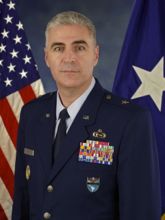
- (Formerly the #2 man in ISAF in Afghanistan, General Thomas W. Geary is now in charge of Intelligence at SOUTHCOM.)
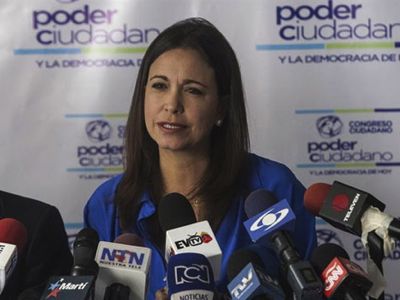
- The coup was supposed to place Corina Machado in power María. On January 26, she hosted her main foreign accomplices in Caracas.
To facilitate the coordination of the coup, María Corina Machado organized a symposium in Caracas on January 26, “Citizen Power and Democracy today”, which was attended by most of the Venezuelan and foreign personalities involved.
By tracking these conspirators, Military Intelligence discovered “Operation Jericho”. On the night of February 11, the main leaders of the plot and a Mossad agent were arrested and aviation security was enhanced. Others were rounded up on the 12th. On the 20th, confessions obtained permitted the arrest of an accomplice, the mayor of Caracas, Antonio Ledezma.
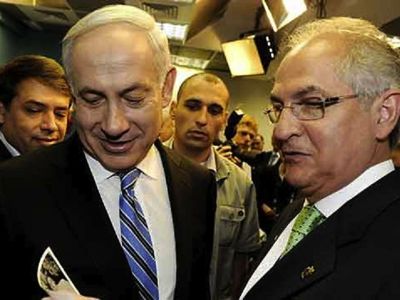
- The Mayor of Caracas, Antonio Ledezma, was the liaison officer with Israel. He secretly went to Tel Aviv, May 18, 2012 to meet with Benjamin Netanyahu and Avigdor Lieberman. He represented the head of the Venezuelan opposition, Henrique Capriles Radonski.
For Venezuelans the failed coup poses a serious question: how do we keep democracy alive, if the main opposition leaders are in jail for the crimes they were about to commit against democracy?
For those who think, wrongly, that the United States has changed, that it is no longer an imperialist power and that now it defends democracy in the world, “Operation Jericho” provides endless food for thought.
The United States against Venezuela:
………
In 2002, the United States organized a coup against elected President Hugo Chavez Frias [1], then they murdered the judge in charge of the investigation, Danilo Anderson [2].
In 2007, they tried to change the regime by organizing a “color revolution” with Trotskyist groups. [3]
In 2014, they seemed to give up their goal and supported anarchist groups to vandalize and destabilize the country, it is the Guarimba [4].”
[1] « Opération manquée au Venezuela », par Thierry Meyssan, Réseau Voltaire, 18 mai 2002.
[2] « Notre ami Danilo Anderson assassiné à Caracas », Réseau Voltaire, 19 novembre 2004. “The CIA behind Danilo Anderson’s Murder?”, by Marcelo Larrea. “FBI and CIA identified as helping Plan Venezuelan Prosecutor’s Murder”, by Alessandro Parma, Voltaire Network, 1 December 2004 and 11 November 2005.
[3] « Venezuela : conclusion d’une année déterminante », par Romain Migus, Réseau Voltaire, 10 octobre 2008. “The Albert Einstein Institution: non-violence according to the CIA”, by Thierry Meyssan, and Gene Sharp’s answer, Voltaire Network, 4 January 2005.
[4] “US against Venezuela: Cold War Goes Hot”, by Nil Nikandrov, Strategic Culture Foundation (Russia), Voltaire Network, 8 March 2014. «Las “guarimbas” de Venezuela: derecha embozada», por Martín Esparza Flores, Contralínea (México), Red Voltaire , 28 de abril de 2014.”
Thierry Meyssan
Political consultant, President-founder of the Réseau Voltaire (Voltaire Network). Latest work in French – Sous nos Yeux. Du 11-Septembre à Donald Trump (Right Before our Eyes. From 9/11 to Donald Trump).
Can Venezuela and its neighbours survive the coming war?
Voltaire Network
Can Venezuela and its neighbours survive the coming war?
Voltaire Network
Voltaire, international edition
...............................
Note to my Google babysitters: Obviously your parents didn't love you because you're unable to function in a pluralistic society. Why are you so obsessed with this very small blog? You have everything. You own the world. Why are you obsessed with me?
...............................
Note to my Google babysitters: Obviously your parents didn't love you because you're unable to function in a pluralistic society. Why are you so obsessed with this very small blog? You have everything. You own the world. Why are you obsessed with me?
.........

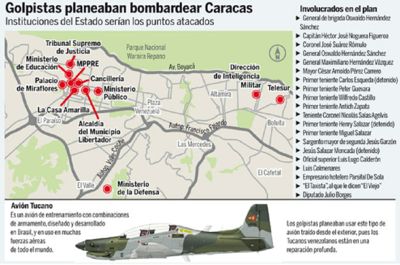
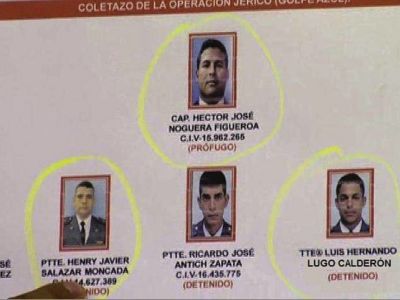
No comments:
Post a Comment